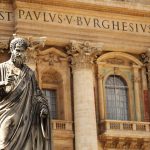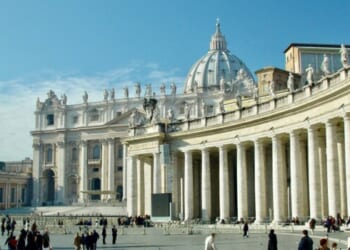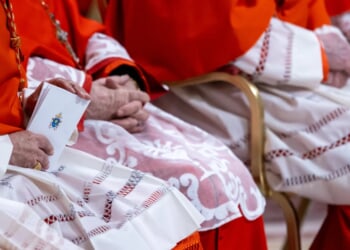To experience Providence is to be touched by the timeless. To experience Providence is to experience the will of God that exists in every moment, accessible to those with the sensitivity to, understanding of, and will to know it. Because of this, humans throughout the ages have differed in their awareness and knowledge of providence.
For most people throughout history, providence is something not felt, nor fully understood, just assumed from teachings of culture, philosophy, or religion. Some individuals, though, meet Providence in the flesh. They are touched by Love directly, knowing it to be the presence of God. And they respond accordingly. Such a person was King David.
David’s story is told in the historical books of the Old Testament, but the direct source to know and understand David are the Psalms. Authorship of most of the Psalms are credited to David, and no doubt many were. The historian seeks authenticity in a primary source by examining the language used to see if the source fits the beliefs and expressions of the time. Another form of testing authenticity is through intuitive awareness of the document, examining it to see if it feels right and authentic, that the person under consideration would have written something like it—in this case, something so revealing, so honest. This is what I find in the Psalms, especially Psalm 51, Psalm 151, and Psalm 139.
Psalm 51 speaks to an historical incident, one which a king as powerful as David would be hesitant to reveal. David committed a grievous crime against another man, the warrior Uriah, who was husband to Bathsheba, a woman that the king wanted, seduced, and wished to marry—but her husband stood in the way. This crime—to commit adultery and kill—defied the laws of man and the commandments of God. King David, simultaneously the anointed one and a seducer and murderer, came to his senses, was overcome with guilt and grief, and cried out: “Against thee only have I sinned!”
It is especially in times of horror, grief, tragedy, pain, embarrassment, and anguish that a person with exceptional intuitive awareness of God experiences His love directly, that is, providentially. At this moment, after the prophet Nathan had confronted David about his crime, David realized God’s eternal presence. When the crime is committed, and God’s will and love faces the criminal, and the guilt overwhelms—that is when a person knows the presence of God. “My sin is continually before me,” David wrote. He could not rid his mind of it, he kept replaying the action in his head—the unquenched lust and the unjustified conspiracy to kill. David had “done evil before thee”—not just evil against Bathsheba, Uriah, and the Hebrew people, but evil against God.
What is most amazing and revealing about Psalm 51 is that David turns from guilt to redemption. He is aware of God’s forgiving love. He knows that God knows that “I was conceived in iniquities, and in sins did my mother conceive me.” This is not a justification for sin; it is a simple fact as a son of Adam. David knows that God’s love and forgiveness are so vast that He will “wash me thoroughly from mine iniquity, and cleanse me from my sin,” and in so doing David will recompense love with love. A renewed and forgiven David will “teach transgressors thy ways; and ungodly men shall turn to thee.” David will become God’s voice of providence: “O Lord, thou shalt open my lips; and my mouth shall declare thy praise.”
David’s awareness of God’s providential presence in his life began when he was a child, when the Lord called him to do what no other person dared to do: meet a skilled killer in battle before the troops of two armies, the Philistines and the Hebrews. David remembers in Psalm 151, that he “was small among my brethren, and youngest in my father’s house,” a shepherd and musician whose “fingers tuned a psaltery.” Against all odds, this child musician stood up, comparatively unarmed, against a giant. The result was the will of God: “I went forth to meet the Philistine; and he cursed me by his idols. But I drew his own sword, and beheaded him.” David knew the result was providential, as he had felt the angel of God anointing him “with the oil of his anointing.”
David’s anointing did not lead to peace in his life as might be expected. The jealous king Saul pursued and tried to kill him, as David recorded: “The enemy has persecuted my soul; he has brought my life down to the ground; he has made me to dwell in a dark place.”
At the end of David’s psalter, there are psalms praising God’s providence, for David was completely aware of God’s will and knew what God wanted of him. And yet, he purposefully defied God. The resulting anguish of his deeds conflicting with his knowledge of right and guilt over wrong led to verses of such piety and love, such fear, such anguish for redemption, for deliverance.
His awareness of God’s awareness is most profoundly stated in Psalm 139. In it, he describes God as knower of all things, as the source of Truth, and as our very Creator. God is with David always—whether awake or asleep; He is part of him, as He is part of all Creation. Such awareness allows David the insight to be able to speak and act in a way that is apt to conform to God’s will.
God is present in the past and future, before and after, in the previous step and the forthcoming step. David’s perception of this is a sure guide in taking the multifarious steps of life: “Thou knowest my downsitting and mine up-rising: Thou understandest my thoughts from afar . . . The knowledge of Thee is too wonderful for me; it is very difficult, I cannot attain to it.” There was a great gulf separating David from God—David’s knowing from God’s knowing. There was no point in hiding, denying, or wishing it to be otherwise: “Whither shall I go from Thy Spirit?” How can an individual being escape from Being Itself? God has been present from birth: “For Thou, O Lord, hast possessed my reins; Thou hast helped me from my mother’s womb.” The chapters of David’s life have a co-author, the Lord: “Thine eyes saw my unwrought substance, and all men shall be written in Thy book.” God formed David, his flesh and his spirit; God brought David from darkness to light; God writes in David’s book of life. “I awake, and am still with Thee.” David experiences an intuitive feeling of God’s presence deep within his own being, and there he finds Being Himself. “Prove me, O God, and know my heart; examine me, and know my paths . . . See if there is any way of iniquity in me, and lead me in an everlasting way.”
Psalm 139 is a brilliant testament to David’s astounding awareness of Providence in his life. God, being outside of time and seeing all simultaneously, means that there is an existence that is not bound to our temporality. The Logos, the Father, and the Holy Spirit see all that was, is, and will be.
Divine Providence as shown in the life and thought of King David is revealed in the Psalms, which we can call the poetry of Providence. Throughout the Psalms, God the Logos interacts in time with the person of King David to bring about His will. David’s gift was to be able to see this ante Christos, when very few people—save the prophets—could.
God’s love and His will are the same. God loves David. God knows his thoughts and actions. He witnesses whether David’s thoughts and actions conform to His will, and He blesses accordingly. If God does this for David, He does it for every human.
The Psalms are therefore an interesting, ironic inner dialogue of temptation and resistance, of submitting to evil then submitting to God, of knowing and deceiving, of sin and redemption. The Psalms portray a reflective personality searching to know God. At the same time, the Psalms are history, a narrative of God’s historical relationship with Israel, Providence among the Hebrew people. Would that we were all historians of Providence, aware of God’s grace, and responders to God’s love with love, coauthoring our life story with the Holy Spirit.
Editor’s Note: This is part 2 in a series on understanding Divine Providence as revealed to us by God and interpreted by man throughout history. Tune in for part 3 on Monday, July 14th!
Image from Wikimedia Commons

















